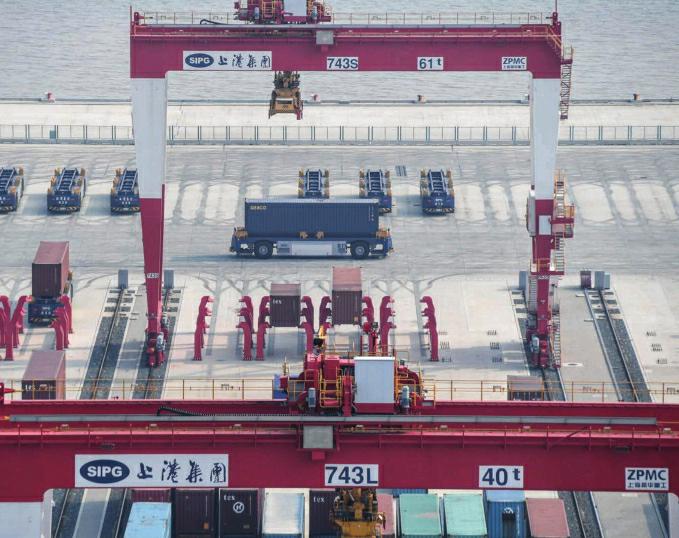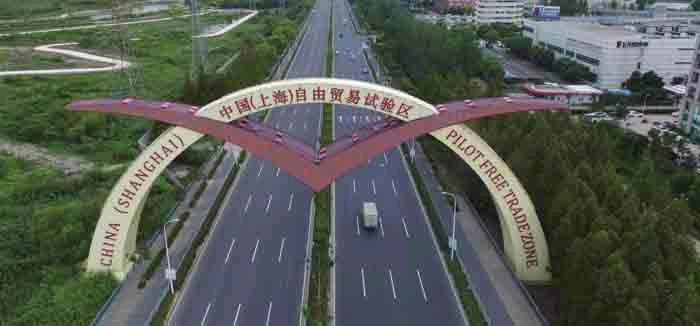A New Port of Call
2017-12-19ByWangJun
By+Wang+Jun
When President Xi Jinping, also General Secretary of the Communist Party of China (CPC) Central Committee, outlined Chinas development blueprint for the next decades in his report to the 19th CPC National Congress on October 18, he laid out a series of ambitious plans. Among them is a pledge to“grant more powers to pilot free trade zones(FTZs) to conduct reform and explore the building of free trade ports.”
The move has “in effect raised the standard for developing the test field for reform and opening up and shown us a new direction with higher standards for ushering in a more comprehensive and in-depth landscape for opening up,” said Gao Feng, spokesman for the Ministry of Commerce(MOFCOM).
“Under the unifi ed leadership of the CPC Central Committee and the State Council, MOFCOM, together with the provinces, municipalities and departments involved, is studying issues concerning the building of free trade ports on the basis of high-standard, high-quality pilot free trade zones,” Gao told a press conference in Beijing on October 26.
Plans are being formulated for free trade port areas in Shanghai, Chinas largest business hub and home to the countrys first pilot free trade zone, according to Gao. In addition, the pilot free trade zone in Zhejiang Province, one of the countrys most economically developed coastal regions, has set the goal of transforming itself into a pilot free trade port up to international standards to facilitate trade in bulk commodities, such as oil products.
Chen Bo, Executive Director of the Free Trade Zone Research Center of Huazhong University of Science and Technology in Wuhan, Hubei Province, said, “The evolution of free trade zones to free trade ports is of great signifi cance to reform and opening up. The aim of free trade ports is to open China wider.”
Shanghai reportedly has submitted a tentative program for piloting the establishment of free trade port areas, and is discussing the scheme with MOFCOM. An implementation plan is expected to be completed within the next few months, Chen said.
Shanghai FTZ version 3.0
The concept of free trade port was first proposed in the State Councils plan for deepening the opening up of the China (Shanghai) Pilot FTZ, issued on March 31, which was the third document of its kind for the Shanghai FTZ.
According to the plan, free trade port areas will be set up in the Yangshan bonded port area and Shanghai Pudong Airports comprehensive bonded area. Industry insiders consider the plans major highlight to be the two new areas.endprint
“The Port of Shanghai serves the Yangtze River Delta and the entire country, therefore improving its efficiency will serve both the regional and the national economy. This is why the government decides to set up free trade port areas,” said Sun Yuanqing, Deputy Director of the FTZ Institute of Shanghai University of Finance and Economics. “Combining free trade areas and port operations will be conducive to developing transit and high-end processing trade and promoting innovation.”
Chen said the State Councils plan requires the highest international standards of opening up to be adopted in Shanghais planned free trade port areas. This means it is intended to compete with top ports worldwide which have the best management professionals and resources, such as Hong Kong of China and Singapore. “From this point of view, the free trade port areas in Shanghai will be more open than the current free trade zone,” he said.
Currently, Hong Kong, Singapore and Dubai are known as the most robust free trade ports in the world. Researchers believe they can provide valuable references for Chinas free trade ports.
But compared to these small economies, China has to protect its domestic industries from being negatively impacted during the opening-up process. “If we are to compete for global resources in the way of Hong Kong and Singapore, we must prepare a lot,” Chen warned.
“The Chinese mainland has made rapid progress in recent years, and our ports are not inferior to Singapore and Hong Kong in terms of handling capacity and infrastructure, but we still have great room for improvement in management efficiency and international business,” said Bai Ming, Deputy Director of the International Market Research Department of the Chinese Academy of International Trade and Economic Cooperation. He added that it will take time for the Chinese mainland to open up further because it involves various institutional reforms.
What to do?
Shanghai, which has container trade with more than 500 ports in 214 countries and regions, has been the worlds busiest container port since 2010. It handled 37.13 million 20-foot equivalent units (TEUs) of containers in 2016, an increase of 3.5 percent year on year.
Shanghai needs to learn from international experience and apply the highest international standards in the process of building free trade ports, Sun said.
At a press conference in April, Zhu Min, Deputy Director of the Shanghai Municipal Commission of Development and Reform, stressed that the city will refer to foreign practices in building free trade ports, research the latest development trends in international trade and investment, and take into account Chinas conditions. “Shanghai will set up free trade port areas in the existing areas under special customs supervision. We are carrying out institutional innovation and working out a new supervision system up to international standards and suitable to Chinas conditions. And we are working with related central government departments on specif ic management measures,” he said.
Chen suggests Shanghai learn from the practices of Hong Kong, Singapore and Dubai in order to make itself a global hub for freight, professionals and fi nancial resources, as well as a provider of services of high added value. “Major measures of opening up and trade facilitation as well as innovative trade and financial patterns must be included in the scheme. In this way, can we demonstrate our resolve to build free trade ports and become prominent in the global competition,”he said.
“Since little potential remains in onshore financial business, Shanghai should focus on the development of offshore trade in the future and further expand offshore fi nancial business and futures trading,” said Chen, who hopes to see some breakthroughs in the implementation scheme for free trade port areas in Shanghai.endprint
